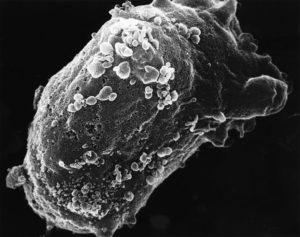At the 9th IAS Conference on HIV Science in Paris, Violari et al. announced that a nine year old South African child has sustained a prolonged HIV remission without antiretroviral therapy (ART). Diagnosed with HIV at 32 days old, the child was enrolled in the Children with HIV Early Antiretroviral Therapy (CHER) clinical trials. Participants of CHER were put two groups: deferred ART or limited early ART for 40 or 96 weeks. The child in remission was placed in the limited ART for 40 weeks group. After 9 weeks of ART, the child’s viral load was rendered undetectable by ART. Follow up blood samples were taken to monitor viral load and the child continues to be healthy. At 9.5 years of age, the child went through a thorough study to assess his health and HIV levels. A small reservoir of virus was found in a small population of immune cells, but there was no evidence of HIV infection. The HIV was unable to replicate and the child experienced no HIV infection symptoms. Using standard assays, HIV viral load was undetectable. While some individuals have a mutation in the CCR5 encoding gene that renders them immune to HIV, the child lacked this mutation. This suggests that early ART treatment was key to the child’s remission.
Researchers acknowledge that this is an extremely rare case. Not all infants who go through early ART will be effectively cured of HIV. Other factors in addition to early ART probably helped the child achieve remission. Further studies on this child may help us understand how the immune system deals with HIV replication and lead us closer to a functional cure.
Article by Maxwell Chan












